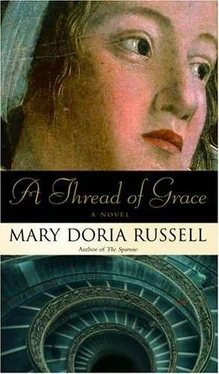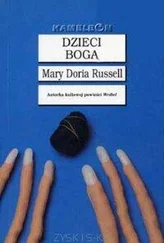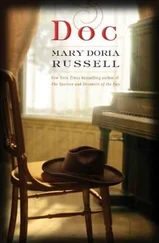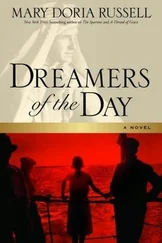PORTO SANT’ANDREA
Angelo Soncini’s little sister died when he was five. Angelo isn’t sorry. Altira was a pest.
Angelo gets yelled at for saying so, but Sara killed his sister. Christian maids weren’t supposed to work for Jews, but Teresina and Dafne kept coming anyway. Babbo said they’d get in big trouble, so he made them stop coming, and that’s when Sara moved in. “Sara made a mistake,” Angelo’s mamma told him. “She needs a place to stay until after her baby, and that’s why she’s our new housekeeper.” Sara was from the Rome ghetto, where a lot of Jews were poor.
“She was not bad,” Angelo’s babbo always said. “She was ignorant.”
Except she killed Altira, and that was bad! Even if Angelo isn’t sorry. Mamma told Sara, “Don’t use that coal oven until we get it fixed.” But Sara didn’t believe a stove could kill a person. When Angelo and his mamma got back from shopping, Sara was crumped down on the kitchen floor, and Altira’s eyes were all rolled up, and the whites showed. Mamma screamed and pushed Angelo out of the kitchen so hard he fell and hurt his knee. He cried, but she didn’t pay any attention, and was just yelling and shaking Altira and opening windows, even though it was cold out. Sara woke up, but Altira didn’t.
A lot of visitors came while the Soncinis sat shiva. They patted Angelo’s hair, and looked sad, and said, “How terrible!” and “Your poor little sister!” and “What a pity!” Angelo went out to play. That’s when he heard Signora Dolcino tell Signora Leoni, “It was a blessing God took that child.” So Signora Dolcino thought Altira was a pest, too.
Things got better after Angelo turned six. Nonna Casutto died, so Angelo’s grandpa came to live with them. One time, some Blackshirts came and shouted slogans in the piazza by the synagogue. Nonno Casutto went out with a pistol. “I’m a Jew and as good a Fascist as any of you! I fought at the Brenner Pass, you little finocchini! ” He shot the pistol into the air and laughed when they ran away. The carabinieri came, but Nonno didn’t care.
Nonno Casutto wouldn’t go to services either. Angelo’s mamma was always yelling at him. “Your son-in-law is a rabbi! You’re setting a terrible example for Angelo, and you’re embarrassing me!”
Nonno just sneered, “Religion is a load of crap.” Angelo laughed because Nonno said “crap,” so Mamma smacked him in the back of the head and yelled at him, too. She never, ever said anything good to Angelo, not once in his whole life. She didn’t care when he cried because he wasn’t allowed to go to school with the other kids. “Your babbo opened a nice new school right here in the synagogue,” she told him. “You’ll have the best teachers— professors from the university! And you’ll make new friends. Everything’s going to be fine.”
She always lies. Last spring she said she wasn’t sick, but she was throwing up all the time. She’s always complaining, too, even though Angelo’s not supposed to. “Iacopo, I can’t do it all! The housework, the cooking— every night you bring people home, and I’m supposed to feed them and make them welcome. One day there’s no water, the next there’s no electricity! My father is a troublemaker, and Angelo argues with me all day long. The air raids are driving me crazy. I’m so tired, Iacopo! I’m just so tired!”
She’s always crabbing about something.
Nonno Casutto was the only person in the world who really liked Angelo. “He’s a boy! Boys are supposed to be noisy!” Nonno said. He always stuck up for Angelo, and that’s why Babbo sent Nonno away to live with Zia Etta in Florence.
Now the single only good thing in Angelo Soncini’s whole life is when he gets to go to Signor Brizzolari’s office at the Palazzo Municipale. The secretary has candy, and she gives Angelo some if he behaves. Behave means you have to sit right next to Babbo, and no talking or fidgeting. That’s hard because it’s so boring, but today it’s even worse than usual, because his mother had to come to Signor Brizzolari, not Babbo, and Mamma always gets all huggy in front of people. Angelo hates that.
“But Signor Brizzolari, what are these families to do?” she asks. “How are they to live without bread? Without milk for their children?”
Sure enough, she rests one hand on her big fat belly and reaches out to place the other on Angelo’s hair. He squirms away. “I’m not a baby,” he says. “I’m going outside!”
Serafino Brizzolari has children and grandchildren. He cannot help smiling as Angelo, an unwilling prop in his mother’s performance, leaves the office to cadge caramelle off the department secretary. Even so, when the two adults are alone the bureaucrat shakes his head with ponderous regret. “Signora, I would like nothing better than to help you, but—” He drops his voice. “I’m not certain I can issue ration cards to Italian Jews now, let alone to foreigners!”
“But surely there’s something you can do! Signor Brizzolari, a man of your compassion? Your importance! If you can’t help us, who can we turn to?”
Like so many Italian women whose menfolk hide from German labor roundups, Mirella Soncini has been thrust into the public sphere despite her advanced pregnancy. She’s put together a classic combination of flattery and supplication that would normally bring this little drama to a satisfying conclusion, which Serafino does not fail to appreciate. Nevertheless…
Stalling for time, he passes a white linen handkerchief over a heavy round face damp with sweat. Ordinarily he carries his great weight and his responsibilities well, but this breathless September heat is hard on him, and today he feels more burdened than usual by his body and his position. He removes his spectacles, rubbing at the sore spots they make on the bridge of his fleshy nose. “Signora, I am powerless.”
“Signor Brizzolari, you can’t mean it!” she says, beginning to realize that he does.
“Signora, you must understand my position—”
Angelo steps back into the room, frowning as he chews. “Mammina, isn’t he going to give us the ration cards?”
Easing to the edge of the wooden armchair, the rabbi’s wife uses both hands to push herself up, and when she speaks, the innocent, flirtatious teasing and operatic pathos have vanished. “Thank you, Signor Brizzolari, for all you’ve done for us in the past. You have nothing to reproach yourself with.” She motions for her purse and the empty shopping bag. For once her son does as he’s asked. “Angelo,” she says, “look carefully at Signor Brizzolari.” Sobered by his mother’s tone, the boy turns serious brown eyes toward the bureaucrat. “Shake the hand of an honorable man,” his mother tells him. “We are in Signor Brizzolari’s debt.”
Alone in his office, Serafino Brizzolari shifts his weight to ease the ache where a buried chunk of Austrian shrapnel lies too near the femoral artery to remove. When the rabbi’s wife walked into his office, he had braced himself for tears, for outrage, for pleading. Nothing would have been more formidable than the grave and manly gesture of a small Jewish boy, shaking the hand that Serafino studies now.
For twenty-six years, Serafino’s own clean hands have had the power to shock him, so certain was he once that he’d never be free of the mud and stink of the Great War’s trenches. His white cuffs are immaculate, his suit freshly pressed and spotless. His shoes gleam. His feet, once foul with wet rot, are dry and sweet, even in summer, even if he must bathe twice a day to keep them that way. All these years, and he’s still jolted awake at least once a week by shrieks and shell blasts. The dreams are so real that for a few moments after waking, he dares not breathe for fear of mustard gas.
Читать дальше












